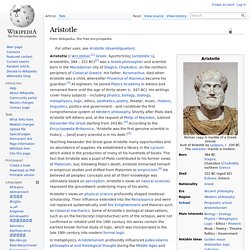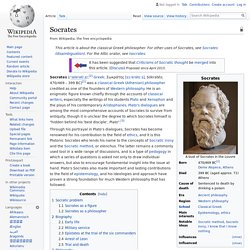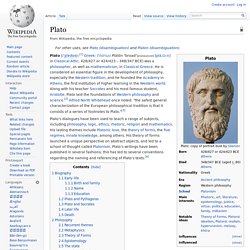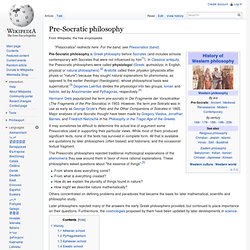

Aristotle. Aristotle's views on physical science profoundly shaped medieval scholarship.

Their influence extended into the Renaissance and were not replaced systematically until the Enlightenment and theories such as classical mechanics. Some of Aristotle's zoological observations, such as on the hectocotyl (reproductive) arm of the octopus, were not confirmed or refuted until the 19th century. His works contain the earliest known formal study of logic, which was incorporated in the late 19th century into modern formal logic. His ethics, though always influential, gained renewed interest with the modern advent of virtue ethics. All aspects of Aristotle's philosophy continue to be the object of active academic study today. The sum of his work's influence often ranks him among the world's top personalities of all time with the greatest influence, along with his teacher Plato, and his pupil Alexander the Great.[9][10] Life Aristotle was appointed as the head of the royal academy of Macedon.
Thought. Socrates. Socrates (/ˈsɒkrətiːz/;[2] Greek: Σωκράτης [sɔːkrátɛːs], Sōkrátēs; 470/469 – 399 BC)[1] was a classical Greek (Athenian) philosopher credited as one of the founders of Western philosophy.

He is an enigmatic figure known chiefly through the accounts of classical writers, especially the writings of his students Plato and Xenophon and the plays of his contemporary Aristophanes. Plato's dialogues are among the most comprehensive accounts of Socrates to survive from antiquity, though it is unclear the degree to which Socrates himself is "hidden behind his 'best disciple', Plato".[3] Through his portrayal in Plato's dialogues, Socrates has become renowned for his contribution to the field of ethics, and it is this Platonic Socrates who lends his name to the concepts of Socratic irony and the Socratic method, or elenchus.
Socratic problem Nothing written by Socrates remains extant. Socrates as a figure Socrates as a philosopher Biography Early life Military service Arrest of Leon Trial and death Notes. Plato. Plato (/ˈpleɪtoʊ/; Greek: Πλάτων Plátōn "broad"pronounced [plá.tɔːn] in Classical Attic; 428/427 or 424/423 – 348/347 BCE) was a philosopher, as well as mathematician, in Classical Greece.

He is considered an essential figure in the development of philosophy, especially the Western tradition, and he founded the Academy in Athens, the first institution of higher learning in the Western world. Along with his teacher Socrates and his most famous student, Aristotle, Plato laid the foundations of Western philosophy and science.[2] Alfred North Whitehead once noted: "the safest general characterization of the European philosophical tradition is that it consists of a series of footnotes to Plato. " Plato's dialogues have been used to teach a range of subjects, including philosophy, logic, ethics, rhetoric, religion and mathematics. His lasting themes include Platonic love, the theory of forms, the five regimes, innate knowledge, among others. Biography Early life Birth and family Name Education.
Pre-Socratic philosophy. Pre-Socratic philosophy is Greek philosophy before Socrates (and includes schools contemporary with Socrates that were not influenced by him[1]).

In Classical antiquity, the Presocratic philosophers were called physiologoi (Greek: φυσιολόγοι; in English, physical or natural philosophers).[2] Aristotle called them physikoi (physicists after physis or "nature") because they sought natural explanations for phenomena, as opposed to the earlier theologoi (theologians), whose philosophical basis was supernatural.[3] Diogenes Laërtius divides the physiologoi into two groups, Ionian and Italiote, led by Anaximander and Pythagoras, respectively.[4] Hermann Diels popularized the term pre-socratic in Die Fragmente der Vorsokratiker (The Fragments of the Pre-Socratics) in 1903. However, the term pre-Sokratic was in use as early as George Grote's Plato and the Other Companions of Sokrates in 1865. From where does everything come? From what is everything created? History[edit] Milesian school[edit]